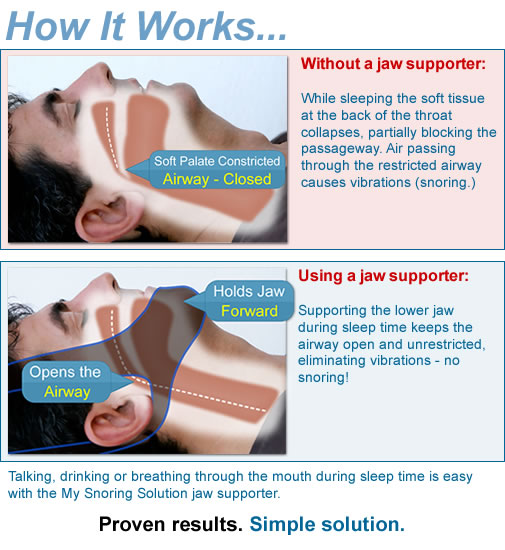If you snore, you’re not alone. While nearly everyone snores occasionally, 44 percent of males and 28 percent of females snore regularly. Snoring doesn’t have to be a concerning habit, but if you possess certain risk factors or signs that will be discussed later, it may be an indication that your health is being affected. Snoring may also indicate that you have obstructive sleep apnea, a condition with known negative health consequences.
What is snoring?
Snoring is described as a noisy breathing sound during sleep. It is produced by the vibration of the upper airway. Snoring results when air cannot find its way through the mouth and nose due to an obstruction.
What is sleep apnea?
Obstructive sleep apnea (OSA) is a sleep disorder where obstruction of the normal air flow of breathing results in periodic moments of non-breathing or very slow breathing. The lack of proper breathing disrupts sleep, leading to some people awakening while sleeping, especially while snoring or snorting. This condition may also cause restlessness while sleeping.
How do I know if I snore?
People sleeping alone may not know if they snore. If you fall into that category, the best way to definitively determine if you snore is to setup a simple recording device. Every smartphone should have a feature to record sound, but failing that you could always use a tape recorder. “Snoring Reasons Why,” anyone? [Pop culture reference, probably not appropriate but you know your audience]
Am I at risk of snoring, or at risk for OSA?
Some people are more likely to snore or have OSA based on certain risk factors, including age and gender:
- Men tend to snore more than women
- Snoring is more common with increasing age
- Smoking, both current smokers, and possibly former smokers
- Obesity
- Alcohol use
- Use of specific medications including benzodiazepines (Z-drugs) and narcotics
Select medical conditions, such as high blood pressure (hypertension), heart disease and diabetes mellitus are also correlated to snoring. If you aren’t sure if you have these conditions, a visit to your healthcare provider for an annual physical would provide that knowledge.
Effects of snoring and OSA
As snoring indicates disturbed airflow during sleep, the effects of snoring and OSA will mirror effects of poor oxygen delivery. Oxygen shortage can manifest by:
- General fatigue, tiredness or malaise
- Daytime sleepiness
- Poor concentration
- Not feeling well rested upon awakening from sleep
- Awakening frequently from sleep
Lack of adequate, restful sleep has been linked to issues in general brain function (cognition), increased accidents and injuries, and heart disease.
How can I fix snoring or OSA?
Many treatment options are available for snoring. If you are overweight, weight loss is the simplest and most effective form of treatment. Weight loss should be steady rather than rapid, about 1 to 2 pounds per week. Reduce the amount of food you are eating and increase exercise for healthy weight management.
Using a jaw supporter can be helpful, which provides support to the back of the throat and prevents a collapse of the airway.

If you are diagnosed with OSA, you will use a continuous positive airway pressure (CPAP) device. CPAP is a mask that provides forced air into your mouth and nose while you sleep. This device prevents a collapse of the airways and allows air to flow unobstructed. Try to use your CPAP machine as much as possible while you are sleeping.
Beyond weight loss, the jaw supporter and CPAP, there are also complex surgical and neurostimulation options.
If snoring is severely impacting your quality of life, you may want to consider an appointment with your healthcare provider for an accurate diagnosis, as there are many causes of snoring and OSA.
The information presented in this article is not medical advice and should not guide your medical decision making. Please consult a health professional for qualified medical advice. You can also read this guide to help improve your sleep.
